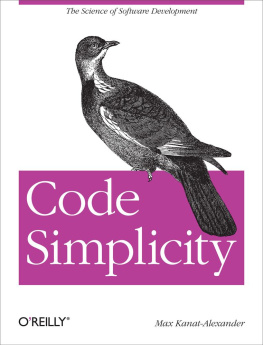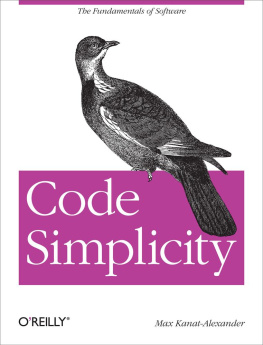Max Kanat-Alexander - Code Simplicity: The Science of Software Development
Here you can read online Max Kanat-Alexander - Code Simplicity: The Science of Software Development full text of the book (entire story) in english for free. Download pdf and epub, get meaning, cover and reviews about this ebook. year: 2012, publisher: OReilly Media, genre: Computer. Description of the work, (preface) as well as reviews are available. Best literature library LitArk.com created for fans of good reading and offers a wide selection of genres:
Romance novel
Science fiction
Adventure
Detective
Science
History
Home and family
Prose
Art
Politics
Computer
Non-fiction
Religion
Business
Children
Humor
Choose a favorite category and find really read worthwhile books. Enjoy immersion in the world of imagination, feel the emotions of the characters or learn something new for yourself, make an fascinating discovery.
- Book:Code Simplicity: The Science of Software Development
- Author:
- Publisher:OReilly Media
- Genre:
- Year:2012
- Rating:3 / 5
- Favourites:Add to favourites
- Your mark:
Code Simplicity: The Science of Software Development: summary, description and annotation
We offer to read an annotation, description, summary or preface (depends on what the author of the book "Code Simplicity: The Science of Software Development" wrote himself). If you haven't found the necessary information about the book — write in the comments, we will try to find it.
Every complexity of software design, simplified and codified at last, for use by every programmer, from the novice to the architects of major applications. This book contains the fundamental laws of software development, the primary pieces of understanding that make the difference between a mid-level/junior programmer and the high-level senior software engineer. The book exists to help all programmers understand the process of writing software, on a very fundamental level that can be applied to any programming language or project, from here into eternity. Code Simplicity is also written in such a way that even non-technical managers of software teams can gain an understanding of what the right way and the wrong way is (and why they are right and wrong) when it comes to software design. The focus of the book is primarily on software design, the process of creating a plan for a software project and making technical decisions about the pattern and structure of a system.
Max Kanat-Alexander: author's other books
Who wrote Code Simplicity: The Science of Software Development? Find out the surname, the name of the author of the book and a list of all author's works by series.











